Star Trek: The Next Generation First Season
Original air dates: September 1987 May 1988
Executive Producer: Gene Roddenberry
Co-Executive Producers (“Coming of Age” forward): Rick Berman & Maurice Hurley
Captain’s Log: Considered by many to be the least of The Next Generation‘s seven seasons, the first season frankly earned that particular reputation. The episodes were uneven, poorly plotted, ineptly scripted, and acted by actors who were still trying to figure their characters out.
To make matters worse, the show was wracked with behind-the-scenes drama. While Gene Roddenberry gets sole credit with creating the show, in truth TNG had many people involved in its creation and development, among them Robert H. Justman, D.C. Fontana, and David Gerrold, none of whom were still involved by the end of the first season. (Indeed, per Writer’s Guild regulations, Fontana, as the co-writer of “Encounter at Farpoint,” should have had equal co-creator credit with Roddenberry.) Roddenberry’s own failing health and his leaving much of the work of being showrunner and guardian of the Trek franchise to others—his assistant Susan Sackett, his lackey Richard Arnold, his lawyer Leonard Maizlish—led to a certain amount of chaos surrounding the production of the show that it’s sometimes amazing that the first season was as good as it was.
That turmoil also led to two departures. Denise Crosby would grow frustrated with the lack of development of her character (apparently not noticing how little everyone else got, too), and asked to be written out, which she was in “Skin of Evil.” After this season, Gates McFadden would depart the show due to differences with co-executive producer Maurice Hurley, though she, at least, would return after a year.
Adding to the drama, a writers strike hit at the very end of the season, forcing several episodes to air in draft form, leading to a weak ending for the season (“We’ll Always Have Paris,” “Conspiracy,” and “The Neutral Zone” all feel as if they could have benefitted from rewrites that never happened).
Anyhow, a look back at the rewatch of season one before we commence with season two’s premiere, “The Child,” on Thursday….
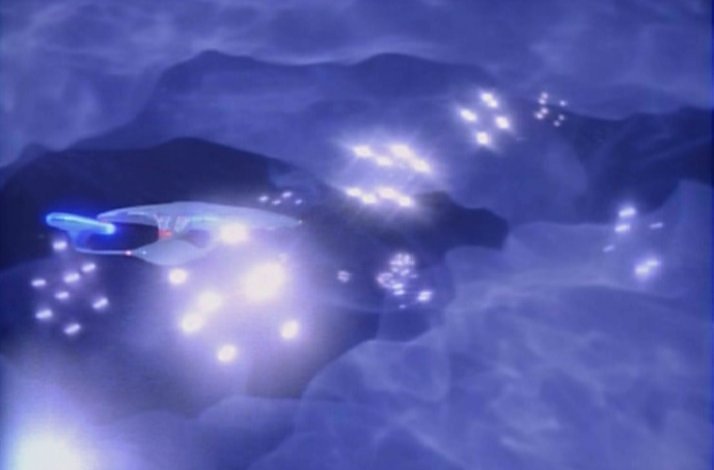
Highest-rated episode: “Where No One Has Gone Before,” with a warp factor of 8.
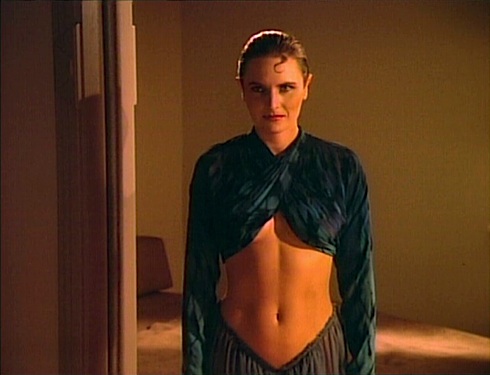
Lowest-rated episode: A tie among “The Naked Now,” “Code of Honor,” “Justice,” and “Angel One,” all with warp factors of 2. (Don’t worry, I will go as low as 1, but I’m saving that for really really special episodes….)
Most comments (as of this writing): “The Naked Now” with 36. “Coming of Age” is a close runner-up with 31.
Fewest comments (as of this writing): “We’ll Always Have Paris” with 8. Apparently nobody cares about Picard’s love life, as this is the only episode to still be in the single-digits as far as commenting goes.
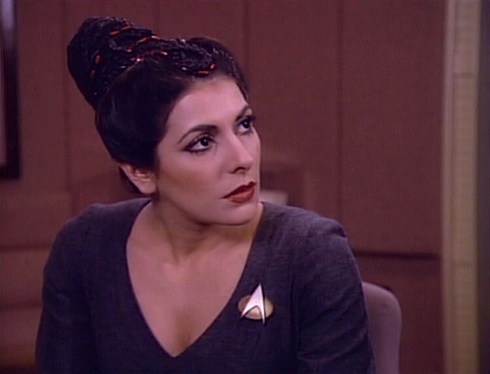
Favorite Thank You, Counselor Obvious: From “Coming of Age“: When Troi is being interrogated by Remmick, he asks if Picard suffered any mental lapses. Troi says no, and Remmick brings up the events of “The Battle.” When Troi points out that Picard was controlled by a mind-altering machine against his will, Remmick says, “I would call that a mental lapse.” Troi at that point stews in annoyance, as if she’s been defeated by Remmick’s verbal trickery. What Troi should have said in response was something like: “You can call it that all you want, but since I’m a trained therapist and have medical degrees in psychology and stuff, I think my definitions of a mental lapse are of more use than those of an IG [Inspector General] drone. Also: stop staring at my cleavage.”
Favorite Can’t We Just Reverse the Polarity? Also from “Coming of Age“: The first two options listed when Jake’s shuttlecraft breaks down are the tractor beam and the transporter, but said options are rejected because the shuttle is too far away. What a pity that they’re not in a space ship that is capable of locomotion under its own power and would therefore be able to cut the distance by moving closer to the shuttle .
Favorite What Happens On The Holodeck, Stays On The Holodeck: From “The Big Goodbye“: The first holodeck-gone-bad episode, which would become a cliché in due course. The notion that the holodeck could ever allow someone inside it to be hurt is distressing, and the apparent risk that simply shutting the holodeck off would kill the people inside it is ridiculous. Who built this thing, anyhow?
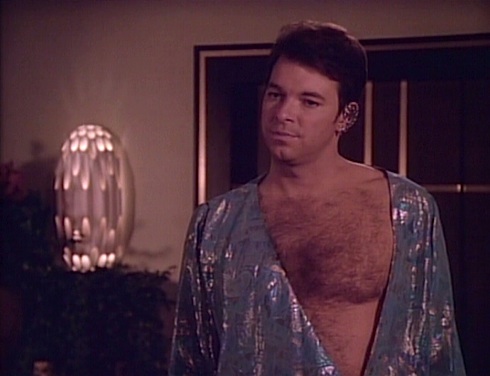
Favorite No Sex, Please, We’re Starfleet: From “Angel One“: Riker dresses like one of the locals, which involves tight pants and a shirt that reveals most of his chest hair. Dress like a rent boy, get treated like a rent boy—Mistress Beata immediately takes him to bed. I’m not sure, but I’m fairly certain that that’s an ethics violation .
Favorite The Boy!? From “Hide and Q“: Wes gets aged ten years, fulfilling his wildest dreams, and earlier in the episode he’s stabbed in the back, fulfilling the wildest dreams of the legions of Wesley-haters. Both, however, are reversed.
Favorite If I Only Had a Brain… From “Lonely Among Us“: Data first learns of Sherlock Holmes and starts emulating him—or, rather, emulating popular conception of Holmes since, at one point, he says, “it’s elementary, my dear Riker,” a turn of phrase that Holmes never actually used. Since Data is the most literal-minded person imaginable, he would never use this phrase based on his comprehensive study of Holmes. However, Data’s Holmes fetish becomes an entertaining recurring theme.
Favorite There is No Honor in Being Pummeled: From “Datalore“: Lore beats the crap out of Worf in the turbolift to show how tough he is. Why crying “emergency close” closes off all options isn’t made clear. (Why didn’t the security guards get the doors back open? Why didn’t Worf yell “emergency open”?) But hey, Lore must be tough, he can beat up the Klingon .
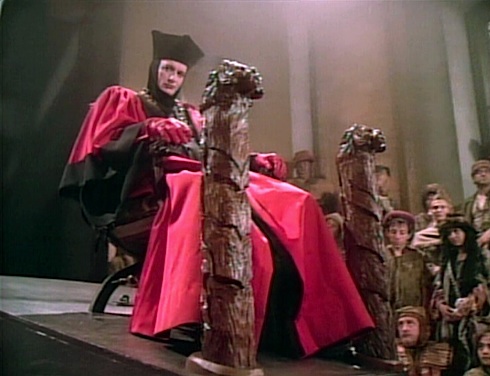
Favorite Welcome Aboard: Of the guest stars in season one, the best has to be John deLancie as Q, providing an iconic antagonist for the TNG crew in “Encounter at Farpoint” and “Hide and Q.”
Honorable mention must be made of the following: Vaughn Armstrong, who commenced his record-setting dozen guest characters with Korris in “Heart of Glory.” Marc Alaimo, who appeared as an Antican in “Lonely Among Us” and a Romulan in “The Netural Zone,” the first two of several guest turns on TNG before taking on the recurring role of Gul Dukat on Deep Space Nine. Colm Meaney, who appeared as a relief conn officer in “Encounter at Farpoint” and a security guard in “Lonely Among Us“—he would settle in as the transporter chief in season two, soon getting a name, and eventually going off to DS9 as well. Majel Barrett, who kicked off the overwhelming Lwaxana Troi in “Haven.” Brooke Bundy, Biff Yeager, Vyto Ruginis, and Walker Boone play four different chief engineers in five episodes, making it abundantly clear that they really needed to have a regular chief engineer (a problem that would be solved in season two).
Still, though, the high point for me remains seeing Robert Knepper in a mullet in “Haven.” T-Bag, what happened to you, man?
Favorite Trivial Matter: All the feeble excuses I contrived to mention my own Star Trek novels.
Make it So: It’s easy to forget now, because we’ve seen the subsequent six seasons, and also because we’ve seen a whole lot of good science fiction on television the past 25 years, but TNG was one of the few genre shows that even existed in the late 1980s. It was a groundbreaking show in more ways than one: besides paving the way for the genre shows that would come immediately after it (Alien Nation, Babylon 5, The Flash, Hercules: The Legendary Journeys, Highlander, Xena: Warrior Princess, etc.), it also created a new market. Prior to TNG, only game shows ran in first-run syndication. The show’s ratings success made it possible for other shows to follow that path to success (including some of the ones I just listed).
Yes, it had some stiff acting and some clunky scripts, but it also gave us a collection of characters whose popularity remains to this day, particularly Captain Jean-Luc Picard, not to mention Data and Worf (they are still truly the “big three” of TNG).
You gotta start somewhere.
Warp factor rating for the season: 5
Keith R.A. DeCandido was in college at Fordham University when TNG debuted, but his desire to write Star Trek fiction actually goes back to high school, when he first started reading them. So it was kind of a thrill to be hired in 1999 to both write a TNG comic book (Perchance to Dream) and a TNG novel (Diplomatic Implausibility, which was published in 2001). Go to his web site for info on ordering his most recent books (the genre-bending police procedurals Unicorn Precinct and SCPD: The Case of the Claw and his Dungeons & Dragons novel Dark Sun: Under the Crimson Sun), as well as links to his blog, Facebook, and Twitter, not to mention his twice-monthly podcast Dead Kitchen Radio, and the other podcasts he works on (The Chronic Rift and HG World).










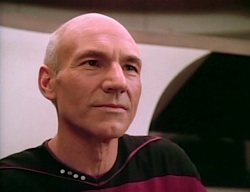
Much as I hate to be “that guy”, didn’t The Muppet Show originally air in first run syndication in the US? It wasn’t a game show and it predated TNG by some years.
I wouldn’t have rated this season as high as 5, however, I think you’ve been right on all through this re-watch. I watched this (as I’ve done all ST) when it was originally on (and I watch it quite regularly on dvd now). I remember thinking, at the time, that it was amazing it survived the first season. I also remember thinking that it had so much potential too. Seasons 2 through 7 did not disappoint!
@1: It did, as did In Search of, The Starlost, and several other shows. But they all aired in the 7:00 – 8:00 PM “local programming” slot. TNG was the first to pull it off in prime time. It was definitely a game-changer.
1987 also saw the first season of Beauty and the Beast which arguably was as important for the fantasy series that followed as was ST: TNG was for sf series that came after. And it’s worth noting that British version of the Max Headroom series pilot aired before ST: TNG came on the air even the US debut of that series would be in 1988.
Thanks for the episode reviews, Keith! I’m going to be finishing my own rewatch this week, with All Good Things, and I look forward to reliving it all again as you work your way through the next 6 seasons.
Hmm. I thought The Muppet Show was an ITV production. Did the episodes air in England before the U.S?
You said:
“(Don’t worry, I will go as low as 1, but I’m saving that for really really special episodes….)”
So my question is (given we know what’s coming in the next 6 seasons) will you go as high as 10? Are there any episodes you would consider essentially perfect?
As an aside this blog has caused me to rewatch TNG too.. it’s been quite fun. I wonder if Tor will get someone to do the remaining 3 series (regardless of the diminshed fanbase of those). I’m thinking J&G Reeves Stevens for DS9 (or SD Perry), Kirsten Beyer for Voyager, and Andy Mangels for Enterprise.
“Hmm. I thought The Muppet Show was an ITV production.”
Yes, it was.
“Did the episodes air in England before the U.S.?”
It ran in both countries at the same time, though not necessarily in the same episode order. In the UK it ran on ITV, in the US on CBS affiliates in first-run syndication.
5 seems a little high for season 1, unless you just averaged out all the episodes, and it came out that way.
I’m guessing you’re saving the “1” rating for 2 episodes: “Shades of Gray” (which most fans consider to be the worst of the whole series) and “Genesis” (my personal choice for worst of the series). I’m also assuming we’ll get some 9’s and 10’s every season starting with Season 2.
It’s funny, watching Troi this year, I feel that the only episode in which she did and real psychiatric counseling was in the finale, with the 20th century female survivor. It seems that her role as “Counsler” in season 1 is to advise Picard about how other people (particularly outsiders to the Enterprise crew) might react in the crisis situation (which is part of her job anyway, but could really have been done by any Beatzoid). Then, as we will see in the Season 2 premire, the first thing we see Guinan do is counsel a crewmember, which makes Troi somewhat useless (she is rather busy in that episode, to be fair).
All in all, I’m enjoying looking at this series again (it’s in my top 5 favorite shows of all-time), even if the first season mostly stunk. Can’t wait until we hit around the middle of Season 3. That was when the show really hit it’s stride, IMO.
John@@@@@ #8: Thank you. I was wondering if the show was re-aired or not. It was kind of hard to tell.
While you’re correct that season one was not the strongest, there is another side to it. The season one producers and writers created some fertile soil for the rest of the series. They were good at creating concepts and characters that could be used to great advantage later, even if they weren’t always used so well in the first season.
Season one writers and producers created the regular characters. They gave us interesting backstories for Data and Worf that would define many of the episodes that heavily featured them. They introduced Q and Lwaxana Troi, two of the series’ most enduring and beloved guest stars. They established a new version of the Star Trek universe where the two-fisted adventure of an open frontier had been replaced by diplomacy and political intrigue. They showed us what peace looks like between humans and Klingons. They updated the Romulans, introduced the Ferengi (substandard villains but top-notch satire), and planted the seeds of the Borg. Among my favorite episodes from later years that have their roots in a season one episode are “Elementary, Dear Data,” “Q Who?,” “Deja Q,” “Yesterday’s Enterprise,” “Sins of the Father,” “Menage a Troi,” “Brothers,” “Remember Me,” “Legacy,” “Future Imperfect,” “Qpid,” “Half a Life,” “Silicon Avatar,” “Cost of Living,” “Ship in a Bottle,” “Birthright,” “Descent,” “Tapestry,” “Journey’s End,” and “All Good Things…”.
Most impressively of all, the TNG season one writers and producers resisted the urge to base their series on Classic Trek aliens, worlds and characters because they recognized the only way for TNG to be as good as its predecessor was for it to stand on its own two feet. This decision — to try to make something new rather than build the series on the foundation of TOS — probably caused most of the missteps that the season is so heavily criticized for. It is also, without a doubt, the reason that TNG eventually flourished and, in the minds of some, surpassed Classic Trek.
It’s difficult for me to watch TNG season one without seeing some of the concepts that were put into play here that were NOT followed up later in the series. The idea that space and time and thought are connected (from “Where No Man Has Gone Before”) was fascinating, but dropped. Will and Deanna’s relationship began as an attempt to explore platonic, unselfish love, but ended up becoming a conventional romance story prone to jealousy and eventually concluding with marriage. The concept that a group of shameless capitalists is the Federation’s greatest enemy is full of all sorts of interesting connotations, perhaps a little too interesting for primetime television in the USA. A lot of the early episodes describe Data as more of a partially organic, biosynthetic lifeform instead of a robot made of metal and computer circuits, but this was quickly changed and an opportunity to explore biotechnology was lost. Data’s gradual evolution towards humanity was continued in season two, but by season three his development along these lines had become stagnant, much to the character’s detriment. And, speaking more generally, TNG season one makes the Star Trek universe seem much more strange, vast and mysterious than it ever seemed again. Future season got away from the Classic Trek vision of a universe where anything was possible, where humans had only begun to scratch the surface of the unknown, and where we were surrounded by beings so advanced (such as Q, the Traveler, or the Edo god) that their knowledge and technology appeared almost magical to us. This feeling was lost as TNG went forward.
TNG season one wasn’t the best, but I think it was far from the worse (the lackluster season two or the phoned-in season seven would get that honor, in my book). Despite behind-the-scenes problems, the producers and writers created some wonderful characters and narrative ideas. Some were adopted and expanded upon successfully. Some were dropped by later creative teams, and the show suffered for it. I think we should give credit where credit is due, and grant that, while there were failures as well as successes, the first season showed no lack of ambition or audacity. Rather than a mistake that needed to be forgotten, it was the first step on the show’s path to success.
“1” has gotta be for “the royale”
Correction: “if you have a message, put it in a telegram” is the original saying. I meant to modernize it by saying “if you have a message, put it in an email.” Oh, well…
I have to disagree with roblewmac about “The Royale.” I confess to enjoying that one. I would give a 1 to shows like “Shades of Gray” (though at least the director knew he was shooting the cost-saver, and varied the angles as much as possible), and “Angel One” (I think Keith was actually generous with this one). I’m sure there were others, but it’s probably a tribute to the overall quality of the series that they’re not coming to my mind right now.
It’s funny, but I have a hard time watching S1 and S2 episodes just because of the costume changes – I really didn’t like the jumpsuits. S1 is even harder to watch when Riker is onscreen – it has always amazed me how much the beard made SUCH a difference in the charcter.
For me, what was more interesting is watching the development of the ACTORS – not the characters. You can see an obvious difference in quality, especially for the secondary characters, as the show progresses.
“Shades of Gray” is definitely a 1. I’d also nominate “The Dauphin,” “Up the Long Ladder” and “Sub Rosa” — yuck.
Could someone explain the meaning/significance of this to a poor Englander?
Syndicated shows are sold to local stations directly, without going through a broadcast network such as NBC or CBS.
Also, it’s untrue that TNG was the first non-game show sold into syndication. As mentioned above, The Muppet Show, In Search Of, and others were sold that way. TNG was the first one hour drama to succeed with that distribution model though.
Also, someone above mentioned that TNG was shown in prime time. That actually varied quite a bit. I know they ran it in prime time in Los Angeles for at least some of the show’s run, but a lot of the country tended to get it on weekend afternoons or early evening. I usually saw it at 6 or 7 on Saturdays, but sometimes it ran as early as 3 or 4, depending on what other programming the local station had that day (baseball games tended to move the schedule around, for example.)
Braxis and Grenadir,
Here in NY, I believe TNG first aired on WPIX on Sundays at 7 pm, with a replay sometime the following Saturday night. When Deep Space 9 came into being, it took the Sunday slot, and TNG was, I believe, moved to Saturdays at 7 pm, with a late Sunday night replay. TNG was moved to Mondays in Season 7.
One thing PIX was great about with regards to TNG, is that fact that you were always guarenteed 2 showings a week. So, if you missed it the first time, you had a second chance, so most episodes could be watched at some point (no DVR or Tivo in those days, folks). I don’t know how well some of the other markets treated it. Deep Space Nine (along with the other shows mentioned) got shafted once the independant stations went the way of the Buffalo. By the end of Deep Space Nine’s run, I believe PIX was only showing it Saturday nights at 7, with no replay, a dreaded time slot if there ever was one.
I was always amazed that TNG survived its first season. For me the series started to be good when they stopped trying to make Picard the ‘anti-Kirk’ captain. I’ve always felt that they went too far that first season trying to distance themselves from TOS; while, ironically enough, ‘borrowing’ from a number of TOS episodes. ;-)
Kato
I was pretty young when TNG first aired and knew the first season wasn’t the greatest but there was enough there to fire my imagination and keep me interested.
At the time I was pretty devastated that Denise Crosby left as I fancied her.
When one views these season through more jaded eyes it’s apparent that the show was burdened by concepts of TOS. Science Fiction had moved on since the late 60’s/early 70’s but that’s not apparent in some portion of the first season of enterprise.
There are still some pretty cool episodes here and you have to give kudo’s to the inclusion of Worf on the crew. The series and future trek would never of been the same without him.
I haven’t commented on each episode, but I am thoroughly enjoying this rewatch! I have been doing a bit of a rewatch myself since TNG is on Netflix and it’s bringing back a bunch of memories (I wacthed TNG, DS9 and VOY waaaay when they were first aired). I’d love it if you did a rewatch of DS9 next. I’m one of those people who began as a TNG fan but started watching DS9 after “All Good Things” and it ended up becoming my favorite. Your comments about Counselor Obvious keep me laughing out loud.
Oh, and my prediction for the Warp 1 episode… Aquiel.
Well, I guess what TNG suffered from most of all was that the next Trek‘s pilot had already been written – and then presented as Star Trek: The Motion Picture. For TNG, Decker became Riker and the Deltan became the Betazoid. Otherwise, Roddenberry had intended long ago for his next Trek to star the cast of the original series. He’d always had this image in his mind, I’m sure, and reconfiguring it probably took alot of effort. The show was being invented in the first season, which still happens with TV shows today.
I’m not particularly surprised that the series survived the first season, though, when I put it in context of TV in 1987. There were definitely some good shows, but even the good series had sketchy, experimental qualities to them (which, to tell you the truth, I rather miss). And the bad ones? Well, Full House premiered the same year, and look at what a hit it was.
@Pendard – I don’t think “Sub Rosa” even deserves a Warp Factor 1 rating. More like 1/4 Impulse.
TNG was far from the first hour-long drama to succeed in first-run U.S. syndication. Space: 1999 (another ITV production) was one of several such shows in the 1970s. The 1950s and ’60s also featured a number of syndicated dramas in both hour-long and half-hour. TNG was certainly a revival of that market, but not a pioneer.
The first half of the 1st season is especially painful to watch (except for WNOHGB). Picard is basically a jerk, but you can see the underlying man we all grow to respect, shine through occasionally. This comes through very nicely in 11001001 when he and Riker get a chance to be human on the holodeck. Data is rather smarmy early on, but develops his more familiar style after Datalore. Worf is rather wasted, standing at the back of the bridge with his arms behind his back for most of the season. Geordi is annoying as ever, but even more so in the early episodes. I’ll leave Troi, Beverly and Wes for others to pick on. Then there’s Denise Crosby and the awful Tasha Yar. I’m not sure if it was the material, or just a complete lack of talent, but that character was abysmal. Crosby’s delivery was brutal, especially her lack of use of contractions – very unnatural.
The first season definitely has two different halfs. From 11001001 onwards, the show starts to gain traction and the characters become more relaxed in the roles. Conspiracy remains my favourite episode from Season 1.
I actually really like season 1. It’s not the best but when it’s good it’s really entertaining and there’s something cool about seeing the characters develop little by little over the season. Same goes for longer story arcs… the mysterious raids on colonies in the neutral zone that eventually become the Borg. There was also something really unsettling and spooky about a lot going on here that I particularly enjoy… the Ferengi being refered to as cannibals at one point, both the Ferengi and the Romulans had a slow build up, Yar’s flash back to rape gangs and her death, Q is absolutely menacing, as are the Crystalline Entity and Lore, and the “evil Trill” conspiracy was one of my favorites. Call me a sucker for campy 80s scifi-horror but I ate a lot of this season up. I even like the dated, but conceptually interesting episodes with the African and Matriarchal aliens. Plus this season featured the best line of the series: “Shut up Wesley!”
Here’s how I would grade each episode this season:
“Encounter at Farpoint”-4
“The Naked Now”-1
“Code of Honor”-0
“The Last Outpost”-2
“Where No One Has Gone Before”-7
“Lonely Among Us”-2
“Justice”-0
“The Battle”-4
“Hide and Q”-4
“Haven”-1
“The Big Goodbye”-4
“Datalore”-6
“Angel One”-0
“11001001”-7
“Too Short a Season”-2
“When the Bough Breaks”-1
“Home Soil”-6
“Coming of Age”-5
“Heart of Glory”-7
“The Arsenal of Freedom”-5
“Symbiosis”-5
“Skin of Evil”-2
“We’ll Always Have Paris”-5
“Conspiracy”-7
“The Neutral Zone”-1
Average: 3.54
Overall: 3. The first half of the season is shockingly awful. The second half isn’t too bad, actually, but overall, TNG’s first season is really, really bad.
Iceman: thanks for sharing here and elsewhere, though I’m much more curious about the reasons for your ratings than the ratings themselves. I always said the warp factor rating was the least important part of the rewatch, and I stand by that — and have, in fact, abandoned such ratings for my great superhero movie rewatch, to good effect, I think.
—Keith R.A. DeCandido
In an alternate reality, if TNG had never survived it’s spectacularly bad 1st season, it would probably be seen as a failed effort and a bizarre curiosity among Trek fandom, not even a cult classic. The TOS movies would have probably continued a little longer with a younger cast of new characters gradually introduced to take over in the films from the elder statesmen. Thankfully though TNG did great at least ratings-wise season one (and 8/9-year old me still found it entertaining and awe-inspiring) and it would improve a lot the next season and eventually become the huge critical and pop culture success it was.
Not sure if it’s mentioned in a Trivial Matters at some point in this rewatch but Marina Sirtis was nearly fired from the series during its first season. For one thing, the writers had a hard time writing for the character: she’s not even in four episodes that season; and also, Gene Roddenberry felt there were too many women regulars in the cast. The doctor and the chief of security were seen as viable positions but the psychologist not so much. Majel Barret-Roddenberry even confirmed to Marina that she was nearly fired. So it was fortuitous when Denise Crosby asked to leave the show because that meant there were no longer too many women in the cast and ironically Marina was the only one of the three female regulars to survive the first season.
@22/Sihaya: “For TNG, Decker became Riker and the Deltan became the Betazoid. Otherwise, Roddenberry had intended long ago for his next Trek to star the cast of the original series. He’d always had this image in his mind, I’m sure, and reconfiguring it probably took alot of effort.”
It’s more that Roddenberry tended to recycle a lot of his old ideas. TNG was largely based on the formula for the “Phase II” revival that became ST:TMP, with Picard in place of the more mature Kirk, Riker and Troi for Decker and Ilia, and Data for Xon, the Vulcan science officer wanting to learn to be more human. But he also borrowed aspect of Data from the title android of his pilot The Questor Tapes, and the “Post-Atomic Horror” backstory was recycled from his Genesis II/Planet Earth pilots. And Riker’s name came from William T. Rice, the title character of Roddenberry’s first series, The Lieutenant.
@29/garreth: “…if TNG had never survived its spectacularly bad 1st season…”
It only looks bad in retrospect. What people today forget is that most SFTV in the ’70s and ’80s was far worse. By the standards of the day, first-season TNG was terrific. Sure, it had its clumsy aspects, but compared to the likes of Buck Rogers, Knight Rider, Manimal, V: The Series, etc., it was exceptionally smart, thoughtful, ambitious, and well-made. It had terrific actors, top-notch production values, stories that actually had something to say, and science that wasn’t completely idiotic. Only a handful of earlier ’80s shows had come anywhere near its level — the Twilight Zone revival, Starman, the contemporary Max Headroom and Beauty and the Beast.
The reason it looks bad to us now is because SFTV started getting far smarter and more sophisticated in the late ’80s into the ’90s, with shows like Quantum Leap, Alien Nation, Babylon 5, etc., and with TNG itself growing in sophistication as it went on. But it was TNG’s early success that made that later golden age of SFTV possible. So the first season deserves more credit than we give it.
@31/CLB: Oh, I do give it a lot of credit still, it’s just that first season pales in comparison by far with what came later in the series. I’ve said this before but you could watch “Code of Honor” back to back with “Chain of Command, Part II” and it would be whiplash inducing because each of those episodes would feel like they came from completely separate series. The thing that TNG had right off the bat that ensured its survival was immediate high ratings, which would only go higher as well.
@32/garreth: “it’s just that first season pales in comparison by far with what came later in the series.”
Yes, of course it does, and people today constantly point that out. I’m trying to acknowledge the other side of the equation, the part that people today tend not to realize — that nearly everything else in 1970s-80s SFTV paled in comparison to TNG’s first season. Which is why TNG had those high ratings you mention — because by 1980s standards, even its first season was actually pretty damn good.
I can also say being eight at the time, I couldn’t really discern what was bad Star Trek anyway and was immediately hooked from the premiere of “Encounter at Farpoint” and onwards.
@30/garreth: I’m glad I didn’t know back then that Roddenberry considered one third women in the main cast “too many”. Me, I was disappointed that there were so few women in the main cast. A ratio of 2:1 was okay in 1966, but in 1987, it felt outmoded. Especially after all the cool women in 1980s TOS novels.
For some reason, while the roles of the female characters improved in subsequent shows, the ratio never did.
@35/JanaJansen: I agree. More women is always better and I liked how there were three main women roles as opposed to just the one on TOS, so it seems silly that it was ever considered that three was too many. And I also agree that the ratio should have gotten better in subsequent series but never really did. I always thought it would be cool if at least for one series things were flipped and we had a majority women cast and a couple of guys in it. Of course no studio head would be so daring. They’d probably fear their audience would think of it as a “chick show.”
@36/garreth: That would be so cool!
I count three in TOS: Uhura, Christine Chapel, and Janice Rand. Although perhaps Rand doesn’t count because she was only around for part of the first season. But it’s three in TAS: Uhura, Chapel, and M’Ress.
@37/JanaJansen: I get your count for TOS but I always considered Uhura as a regular/main cast and Chapel and Rand were like reoccurring characters. It’s like on TNG I wouldn’t count females characters like Guinan or Nurse Ogawa or Keiko because they were reoccurring roles and not part of the main cast/regulars. But for sure, there were the three prominent females on TAS.
@38/garreth: I agree that it’s hard to draw the line between main and recurring characters. You already mentioned Guinan; I’d like to add Ro Laren because she’s one of my favourites. I count Chapel as main cast because that’s how she always appeared to me, but also because she’s listed in the 1967 Writer’s Guide (“Other running characters: Sulu, Engineering Officer Scott, Lieutenant Uhura, Yeoman, Nurse Christine Chapel”).
Addendum: If there was a point in time when “Yeoman” still meant Rand, but Chapel was already a “running character”, they actually had a better ratio than 2:1. This must be the real reason why they added Chekov :P
@35/Jana: “For some reason, while the roles of the female characters improved in subsequent shows, the ratio never did.”
Not “never,” just prior to the past few years. Discovery‘s core cast just has Burnham and Tilly as regulars and Georgiou as an on-and-off semi-regular, but it has plenty of supporting female characters like Detmer, Owosekun, Cornwell, Nhan, Reno, and Dr. Pollard, plus the non-binary Adira. Picard season 1 had a core cast of 4 men and 3 women, and the majority of its major recurring characters were female (Laris, Narissa, Seven, Oh, Clancy, and Ramdha vs. just Zhaban, Hugh, and Soong). Lower Decks‘ credited main-title regulars are 4 women and 4 men, and the two lead characters (of the lower-decks half and the bridge-crew half) are both women.
@41/Christopher: Ha. So now that I no longer like the stories, they finally achieved the gender ratio I’ve been waiting for? Talk about irony!
It’s still nice.
Well my unlikely dream of seeing the status quo flipped with having a majority female Star Trek cast has finally been realized! The rest of the Strange New Worlds cast has been announced and in total there will be 5 females and 3 males:
https://www.google.com/amp/s/deadline.com/2021/03/star-trek-strange-new-worlds-paramount-series-cast-production-begins-1234713092/amp/